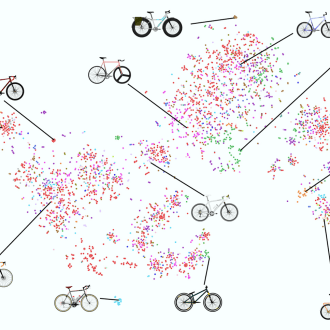The Best of Massachusetts Institute of Technology (MIT)
10+ most popular Massachusetts Institute of Technology (MIT) articles, as voted by our community.
Trending
These are currently making the rounds on Refind.
Engineering household robots to have a little common sense
MIT engineers aim to give robots a bit of common sense when faced with situations that push them off their trained path, so they can self-correct after missteps and carry on with their chores. The…
Massachusetts Institute of Technology (MIT) on Artificial Intelligence
Ensuring AI works with the right dose of curiosity
A new algorithm makes headway in solving the problem of exploration vs. exploitation in reinforcement learning. Developed by MIT CSAIL researchers, it attempts to make decision-making more efficient.
Researchers enhance peripheral vision in AI models
A dataset of transformed images can be used to effectively simulate peripheral vision in a machine-learning model, improving the performance of these models on detecting and recognizing objects that…
Massachusetts Institute of Technology (MIT) on Generative AI
To excel at engineering design, generative AI must learn to innovate, study finds
A new study reveals the pitfalls of deep generative models when they are tasked with solving engineering design problems. The MIT researchers say if mechanical engineers want help from AI for novel…
Massachusetts Institute of Technology (MIT) on Machine Learning
A far-sighted approach to machine learning
A new technique enables artificial intelligence agents to think much farther into the future when considering how their behaviors can influence the behaviors of other AI agents, toward the completion…
«Because of the complexity of this problem, current approaches tend to be myopic; the agents can only guess the next few moves of their teammates or competitors, which leads to poor performance in the long run.»
Robust artificial intelligence tools to predict future cancer
MIT researchers have improved their machine learning system, Mirai, developed to predict cancer risk from mammogram images, and validated their effectiveness with studies across several hospitals.
Massachusetts Institute of Technology (MIT) on Manufacturing
Using artificial intelligence to control digital manufacturing
A new computer vision system watches the 3D printing process and adjusts velocity and printing path to avoid errors. Training the system in simulation, researchers from MIT and elsewhere avoid the…
Massachusetts Institute of Technology (MIT) on Neural Networks
Study urges caution when comparing neural networks to the brain
Neuroscientists often use neural networks to model the kind of tasks the brain performs, in hopes that the models could suggest new hypotheses regarding how the brain itself performs those tasks. But…
Massachusetts Institute of Technology (MIT) on Quantum Computing
A new language for quantum computing
Twist is an MIT-created programming language for quantum computing that can describe and verify which pieces of data are entangled in a quantum program, through a language a classical programmer can…
Massachusetts Institute of Technology (MIT) on Science
Earth can regulate its own temperature over millennia, new study finds
Scientists have confirmed that a “stabilizing feedback” on 100,000-year timescales keeps global temperatures in check.
A new way to see the activity inside a living cell
A new method allows scientists to label and image many different molecules at once within a living cell. The technique, developed at MIT, relies on “switchable fluorophores” — fluorescent proteins…
Massachusetts Institute of Technology (MIT) on Technology
Riddle solved: Why was Roman concrete so durable?
Researchers have discovered ancient Roman concrete-manufacturing strategies that incorporated self-healing. Applying this knowledge toward modern cement production, they hope to improve the material’s…
How to pull carbon dioxide out of seawater
MIT researchers may have found the key to a truly efficient and inexpensive mechanism for removing carbon dioxide from seawater. The method could be far more efficient than existing systems for…
Massachusetts Institute of Technology (MIT) on Voice Computing
“Hey, Alexa! Are you trustworthy?”
MIT research finds that when families interact with a voice-user interface, like a smart speaker or social robot, they are more likely to trust the device, engage with it, and find it to be competent…
Popular
These are some all-time favorites with Refind users.
MIT engineers develop stickers that can see inside the body
MIT engineers designed an adhesive patch that produces ultrasound images of the body. The stamp-sized device sticks to skin and can provide continuous ultrasound imaging of internal organs for 48…
To the brain, reading computer code is not the same as reading language
MIT neuroscientists have found reading computer code does not rely on the regions of the brain involved in language processing. Instead, it activates the “multiple demand network,” which is also…
A tool for predicting the future
By adapting a powerful algorithm, MIT researchers created a user-friendly tool that enables a nonexpert to make predictions with high accuracy using time-series data with just a few keystrokes and in…
«Shah and his collaborators»
One of MIT’s “best-kept secrets” offers an outlet for creative writing
MIT’s Writers’ Group has welcomed a diverse group of community members to share their creative writing work and provide feedback since 2002.
Is diversity the key to collaboration? New AI research suggests so
MIT Lincoln Laboratory research suggests training an artificial intelligence model with mathematically "diverse" teammates improves its ability to collaborate with other AI it has never worked with…
What is Refind?
Every day Refind picks the most relevant links from around the web for you. is one of more than 10k sources we monitor.
How does Refind curate?
It’s a mix of human and algorithmic curation, following a number of steps:
- We monitor 10k+ sources and 1k+ thought leaders on hundreds of topics—publications, blogs, news sites, newsletters, Substack, Medium, Twitter, etc.
- In addition, our users save links from around the web using our Save buttons and our extensions.
- Our algorithm processes 100k+ new links every day and uses external signals to find the most relevant ones, focusing on timeless pieces.
- Our community of active users gets the most relevant links every day, tailored to their interests. They provide feedback via implicit and explicit signals: open, read, listen, share, mark as read, read later, «More/less like this», etc.
- Our algorithm uses these internal signals to refine the selection.
- In addition, we have expert curators who manually curate niche topics.
The result: lists of the best and most useful articles on hundreds of topics.
How does Refind detect «timeless» pieces?
We focus on pieces with long shelf-lives—not news. We determine «timelessness» via a number of metrics, for example, the consumption pattern of links over time.
How many sources does Refind monitor?
We monitor 10k+ content sources on hundreds of topics—publications, blogs, news sites, newsletters, Substack, Medium, Twitter, etc.
Can I submit a link?
Indirectly, by using Refind and saving links from outside (e.g., via our extensions).
How can I report a problem?
When you’re logged-in, you can flag any link via the «More» (...) menu. You can also report problems via email to hello@refind.com
Who uses Refind?
450k+ smart people start their day with Refind. To learn something new. To get inspired. To move forward. Our apps have a 4.9/5 rating.
Is Refind free?
Yes, it’s free!
How can I sign up?
Head over to our homepage and sign up by email or with your Twitter or Google account.


















